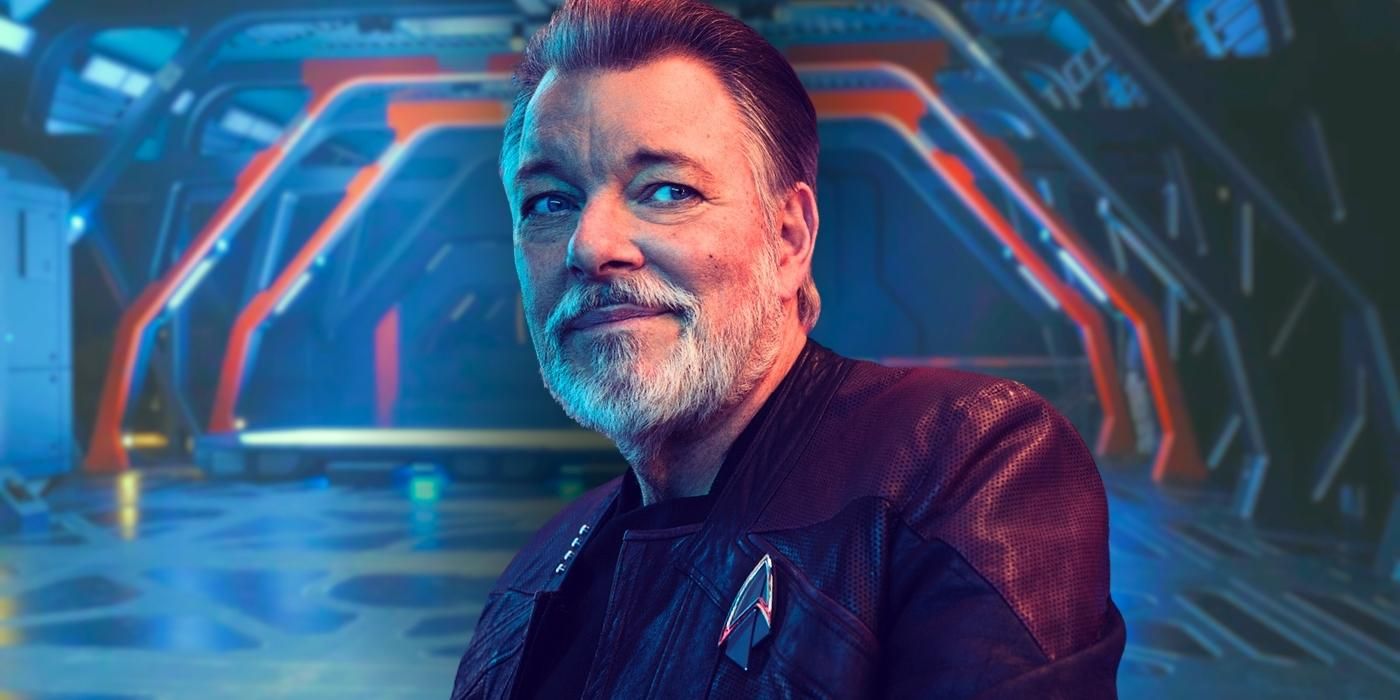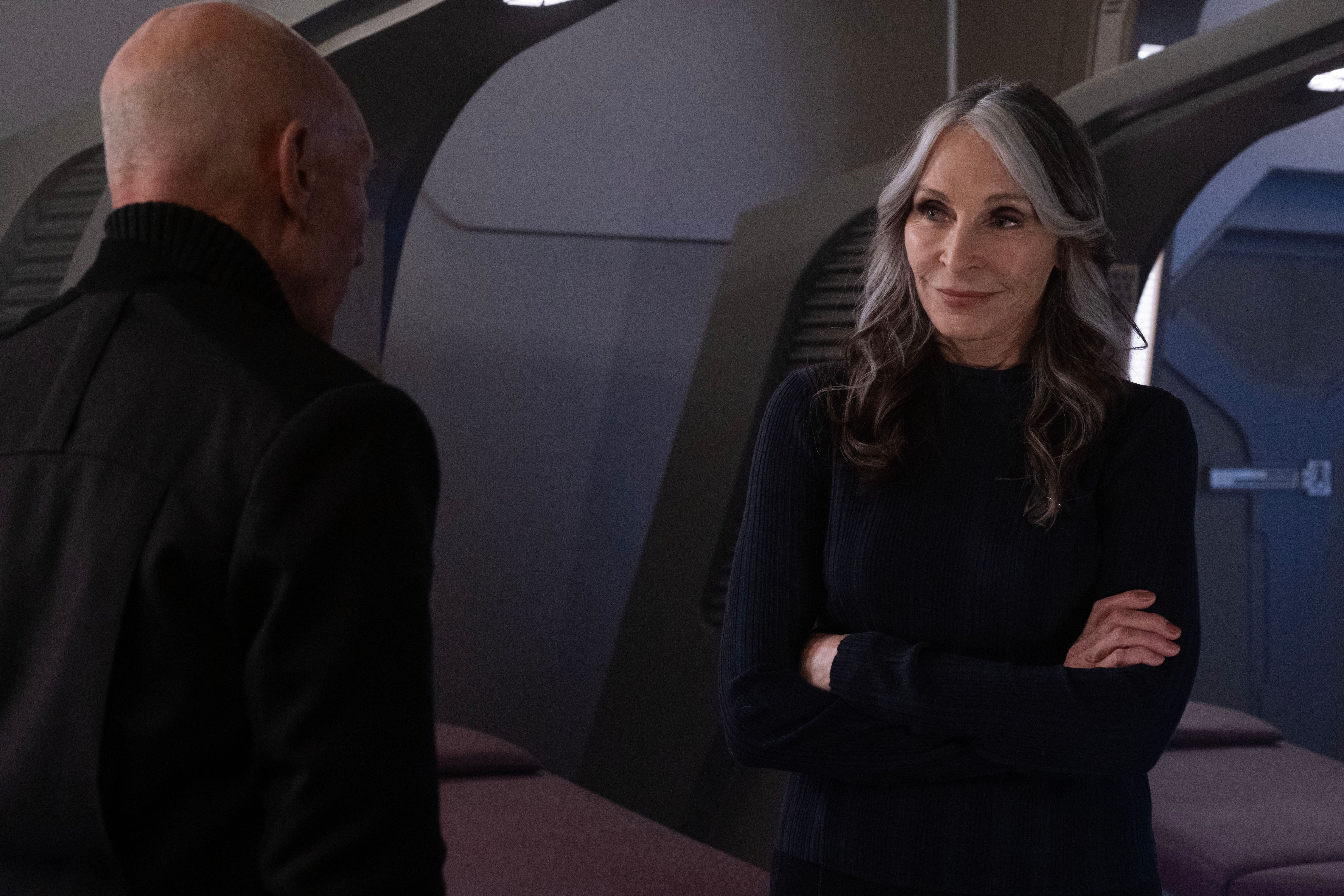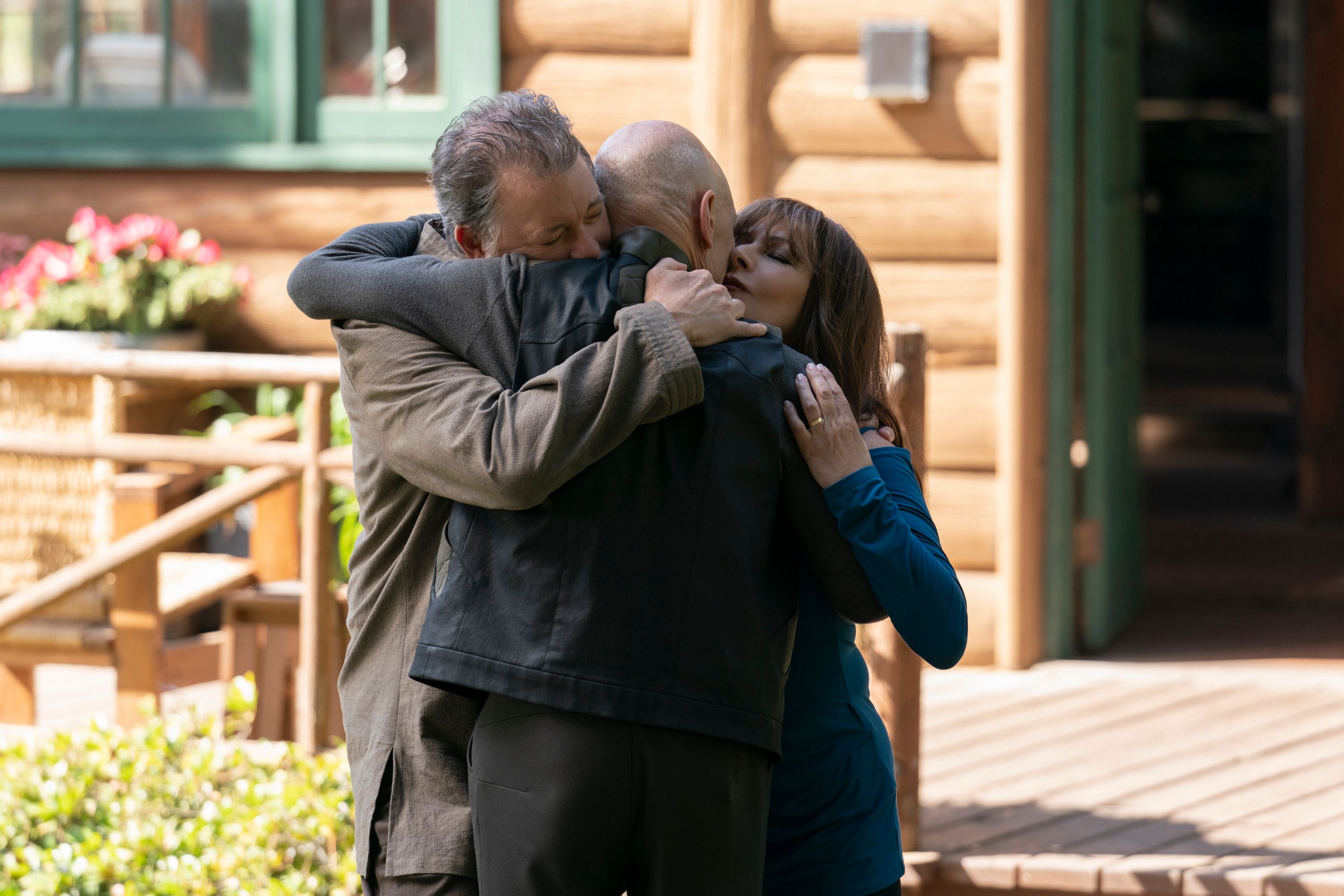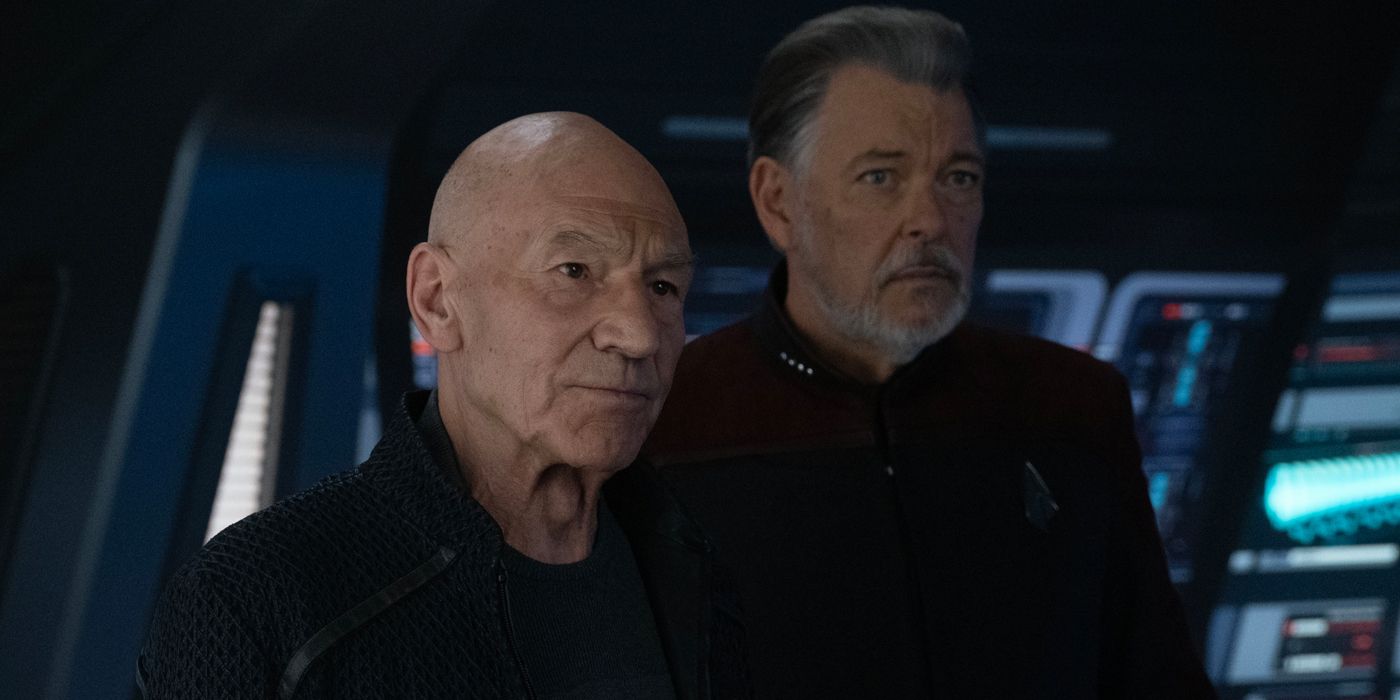With the first six episodes of Star Trek: Picard's third and final season currently streaming on Paramount+, Star Trek fans have a lot to be excited about, as the series has brought back most of the crew of Star Trek: The Next Generation in the most creative and intelligent ways. While William Riker (Jonathan Frakes) appeared in the first season, Season 3 has brought the character back in a much larger way, as it explores not only Riker's friendship with Jean-Luc Picard (Patrick Stewart) but also his marriage to Deanna Troi (Marina Sirtis), which has been strained after the death of their son.
Ahead of the premiere of Episode 6, which is entitled "Bounty," Collider had the opportunity to chat with Jonathan Frakes about Riker's evolution as a character, his friendships and relationships, and directing that pivotal scene between Picard and Beverly Crusher (Gates McFadden) in Episode 3. In addition to these topics, he also spoke at length about why the romance between Riker and Deanna has endured for almost four decades.
COLLIDER: You were in, I think it was two episodes of the first season of Picard, but Season 3 has really given Riker a lot more to do. What has it been like getting to really come back to this role?
JONATHAN FRAKES: It has been thrilling. Better than I dared ever hope. Terry Matalas wrote a season, at least for me, for Riker, the best stuff I've ever had to play, to be frank. So I'm grateful and surprised.
Well, the audience I know is loving it too. In addition to playing Riker, you also came back to direct two episodes this season. What was it like balancing those two roles at the same time, especially when there's so many fantastic Riker moments in those two episodes? Did director Frakes ever have to have a conversation with actor Frakes?
FRAKES: Occasionally, but I mean, I've been lucky enough to do a lot of directing with this cast. I've done a lot of episodes and two of the movies, and so we've been together with that dynamic quite a bit. Also, most of my scenes are with Patrick, who's one of the world's finest actors. So you look into his eyes, and you feel like you're in good hands. I worked with Marina quite a bit, as well, and I have the same vibe with her. There's a lot of shorthand, obviously, and to make sure that we stayed on track, Terry Matalas, again, who wrote the season, was on the set for all of my stuff. And the producing director, Doug Aarniokoski, was also there and has been incredibly helpful to me as an actor and as a director. We have very similar likes and dislikes. So, I had two other directors on the set. I was playing the scenes with Sir Patrick, and the dialogue was brilliant. And I also had my favorite DP. I had Crescenzo Notarile, so I had the trifecta of good fortune.
You had the dream team.
FRAKES: I did kind of.
Episode 3 also features this really fantastic scene between Beverly and Picard—
FRAKES: Oh boy!
It was a scene that felt really long overdue for that relationship.
FRAKES: It's a really long scene. It is.
It's a very, very good scene, but can you talk a little bit about breaking and staging that scene as a director?
FRAKES: Yes. I wanted it to be simple. I wanted the room to be empty, so I had to clear all the people out before Picard arrived, and I wanted them to have obstacles between them. So I used the biobeds as obstacles, and I needed distance, and distance for them to cover as a visual metaphor for when they came to terms, as if they did come to terms, with the truth about– I think both characters had excellent points. Patrick, or Picard – see the Freudian slip? – Picard felt he should have been told that he had a son. Crusher, Gates, believed from her experience with Picard that would be, in a strange way, a burden on the kid, and then felt that when he grew up, that he should know who his father was. So she told him and gave him the choice whether or not to out himself to him.
So it was complicated points of view, both of them arguably right, both of them arguably wrong. And as they came to accept that they were at an impasse, they at least had a peaceful coup d'état. Remember, Beverly closed in on him, and then we cut away to Riker and Jack. When we come back, the two of them are functioning, such as it is, as a unit, as a parental unit, and moving on with the main plot of the season.
It's staged very simply, but those were the objectives. I shot wide so that you could see how distant they were. Then at certain points in the scene, where Gates and Patrick and I felt the movement and the beat changes, the objection changes, and the obstacles and the things are lifted a little bit, and the intentions are clear, and there's a breakthrough. They make a slight move around one of the beds. And I thought it worked great, but it was very simple and plotted out, again with Crescenzo, and the actors accepted the blocking. I always find that if I have a plan that I've thought about, that generally the actors will, if you sell it hard, they'll try it at least, unless they have a better idea.
I'm going to get ship-y because I feel like, let's be honest, Riker and Troi are probably one of the most beloved ships in Star Trek, outside of the Enterprise. What do you think it is about their relationship that has stayed in the hearts of fans for almost four decades now?
FRAKES: Way back at the beginning of Next Gen in 1987, with “Encounter at Farpoint,” which was the title of our pilot, the characters of Riker and Troi were both assigned to serve on the Enterprise, having been lovers in wherever they were prior to that. And that was a very significant and clear part of the story. And as a matter of fact, I remember shooting a scene where Riker was feeling, or hearing, empathically something that Troi was saying or doing. And Troi is a Betazoid and Betazaoids are empathic, so there was something in their relationship that was– it clearly, to Gene Roddenberry and D.C. Fontana who wrote the pilot, and to Cory Allen, it was a very significant part of the relationship.
Oddly and uncannily, the writers during Season 1 decided that they would free Riker and Troi up to have whatever relationships with aliens, and both of them became available, if you will. I know it was convenient. I know it helped the story and gave us episodes to play and all that business. But Marina and I, collectively, believed that we were still in love and that the characters, that it would give us something specific to play in all the scenes that we were in together, because we were in a lot of group scenes, we were in a lot of stuff in the conference room, we were on the bridge together. It was a secret that we kept, and we shared, and the editors always found looks between the two of them, and I think the audience subliminally felt that these two characters did have a very special love for each other. Fast-forward to 182 hours later, and 1, 2, 3, 4 movies later, someone said, "Wouldn't it be great if Riker and Troi got married?" So we, of course, take full credit for having maintained that relationship.
Well, I was going to say, you and Marina have always been the biggest advocates for that dynamic between them and their relationship. So I was curious, what has it been like getting to come back and to play these characters at such a different phase in their life and in their relationship as well?
FRAKES: Age has informed all of these actors and all of these relationships, and I think, at least from my point of view, in a very positive way. Again, to give Terry some credit, or all the credit, he has created certainly...There's a chink in the marriage of Riker and Troi that is suggested right in the first part of Season 3, that Riker tells Picard, "I think Troi would be happy to have me out of town for a while." So that's there.
And also, as you've seen, Riker and Picard are at odds for the first time. So there's conflict. From all of us having had 20 years as actors and 20 years as characters, we've grown in different directions. And as you'll see with the episode that is on tonight with La Forge, everybody's bringing new information to the story. And it's not always hunky-dory, as we say in Pennsylvania.
That's something I've said to Terry as well. I love the way that Picard has brought all of The Next Generation characters back, but also shown that they haven't remained stagnant. Their relationships have changed. They've evolved for better and for worse. They have new information, new sets of morals and beliefs, and it's very believable. I wanted to kind of seize on the thing that you talked about, the new dynamic between Picard and Riker. I kind of see in a lot of the scenes that Riker almost feels like an older brother, maybe as a mentor, because he has experience as a father giving that kind of information and guiding him. What has it been like getting to play that dynamic? Because it's very different from what we see in the movies, The Next Generation, and so on?
FRAKES: I think the setup, intentionally or not, that Michael Chabon, who was with us in the first season, wrote “Nepenthe,” in which Picard came to this magical planet where Troi and Riker had taken their dying son with the hopes of saving his life, and it failed. And he came to see us because he had Soji who was essentially a daughter that he didn't know he had. So we were parent figures then, and specifically, parents who had lost a son. And then, two years later, two seasons later, Picard finds out that he has a son. So the backstory, wisely, provides a real deep truth for Riker to share with Picard that, "If we're going to die, you take these moments to find out a little bit more about your kid. Don't fuck this up. Don't miss this opportunity." So it's been very well plotted, I think, and it's provided me with great stuff.
There's so much great stuff in this season. So I haven't seen the rest of it. I've seen up to Episode 6, but I'm curious if you could tease what your favorite episode is from this next batch of episodes that have not come yet.
FRAKES: I think the finale is quite stunning, frankly.
Everybody keeps teasing the finale. I cannot wait to see it.
FRAKES: Oh, good. That's what we're hoping. I mean, it's been a pretty exciting time to watch people look forward to watching the show on a Thursday the way they used to. It's ironic that it's kind of old school, the way the show was.
Before I got into entertainment journalism, I worked in the film industry, so I'm always really interested to learn people's processes and methods for getting into character. When you play Riker, what is your process? Are you somebody who journals, listens to music, or do you just step into his skin as soon as you're on set?
FRAKES: You know what kind of actor I am, Maggie? Hit it and spit it. Hit the mark, say the line, and get the fuck on with it. That's my approach to acting.
Hey, I bet the crew loves you, because that is the dream right there.
FRAKES: I'm simplifying, but I get my best acting advice from my wife who's a brilliant actor. I'm married to Genie Francis. She said, "You're playing a character who is a leader, and that's all you do at work is lead your crew through making their day. So you don't have to worry about acting like you know how to lead. All you need to do is go to work and the intentions of your lines and don't complicate it." And it's incredibly sound advice.
The first six episodes of the third and final season of Star Trek: Picard are streaming now on Paramount+. Check out our interview with Frakes and LeVar Burton from the Season 3 junket below:




